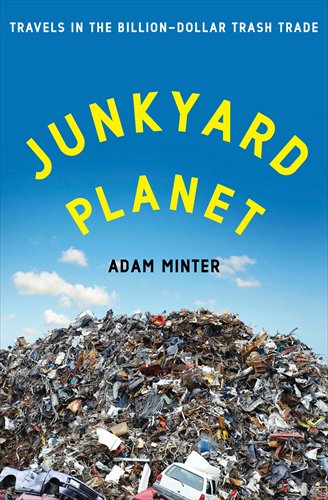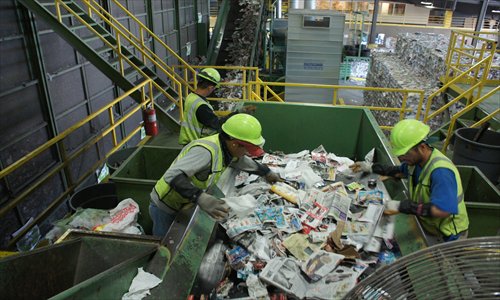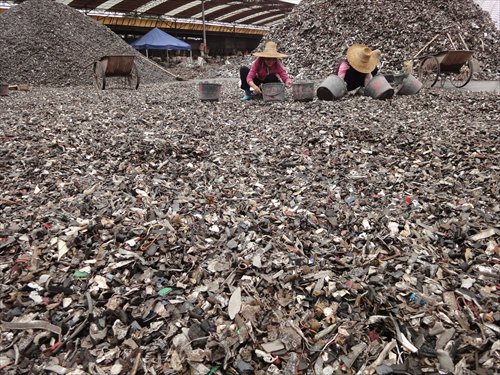One man’s trash

The book cover of Junkyard Planet: Travels in the Billion-Dollar Trash Trade Photos: Courtesy of Adam Minter
Memories of scrapping are deeply etched in the mind of Shanghai-based journalist Adam Minter. Many are from Minter's childhood in Minneapolis, when his grandmother would wake him up before dawn to buy metal vases and jewels at garage sales. Another experience happened some 12 years ago in Shanghai, when Minter visited his first junkyard in China and surveyed an army of hundreds of female workers systematically sorting through a mountain of scrap metal. The metal had been imported from his own country, the United States.

Adam Minter Photos: Courtesy of Adam Minter
Minter has been investigating and writing about the junkyard industry since 2002, mainly in China and the US. Based on his family's history in the business and over a decade of covering the global recycling trade, Minter wrote Junkyard Planet: Travels in the Billion-Dollar Trash Trade, published at the end of last year.
As a child, he saw the dirty and ugly vases that his grandma picked up as a waste of money, but she told him that she might spend $1 on an ugly vase that contained $3 worth of metal.
"From my grandma, I learnt a simple principle about this industry, that is, 'You make your money when you buy something, not when you sell it,'" Minter said, "and it's an interesting and very deep principle that I've applied to many facets of my life that transcend business. It suggests preparation, care, and sacrifice for the long-term."
Minter grew up in the scrap business. His great-grandfather founded the family's recycling company, and as a boy, he worked in the scrap yard sorting junk.
Today the waste management industry has become globalized with a current estimated market value of $1 trillion, according to statistics from the Bank of America Merrill Lynch. By 2020, that figure could double.
"Now," Minter said, "every scrap trader has to constantly pay attention to the London Metal Exchange and the other global market determinants. Any scrap trader who doesn't pay attention to global economic news will risk his or her business."
However, Minter told the Global Times, after visiting over 100 Chinese scrap factories, he discovered that many people in China and the US still fail to see the economic and environmental benefits of this globalized waste disposal system. Many in the West still believe that the export of scrap to recycling facilities in the developing world constitutes "dumping" of foreign trash and exploitation of labor.
"Of course, this industry is not always pretty," Minter added, "but I want to say, the worst recycling is still better than the best mining."

Photos in Adam Minter's book, capturing workers sorting through a mountain of scrap.
GT: What are the most useful things that you learnt from your childhood and family history that have helped you cover the global scrap industry?
AM: When you grow up in a scrap recycling family, you quickly learn to look for the value in the things that other people throw away or overlook. In a scrap business, that's about looking for money. But later in life, after I became a journalist, I found myself looking for stories that other journalists might not value.
For example, many of my colleagues couldn't understand why I'd spend so much time writing about junkyards. But of course, junkyards are a critical and hidden component of the global economy that tell us much about trade between the developed and developing world, as well as the future of the global environment.
GT: Is it true that in the scrap recycling industry, China and the US are deeply interdependent?
AM: That's correct. In fact, what determines where scrap goes isn't whether a country is developed or not, but whether it needs raw materials - in this case, scrap - for manufacturing. China, as a top global manufacturer, needs more scrap (and other raw materials) than countries with smaller manufacturing sectors.
In this case, Chinese demand for raw materials has created markets for American scrap recyclables. If not for China, large amounts of American recycling would end up in landfills or incinerators, and the US scrap industry would be far less robust and profitable. Likewise, if China did not have access to US recyclables, it would need to search for alternative sources of raw materials. More likely than not, China would have to mine and drill. Thanks to US scrap, China recycles, instead.

Photos in Adam Minter's book, capturing workers sorting through a mountain of scrap.
GT: What problem do you think the scrap industry most urgently needs to resolve?
AM: The recycling industry needs to work more closely with product manufacturers to make products that are easier and safer to recycle. In my opinion, that's the best hope for making this a more sustainable industry over the long-term.
GT: Is there any aspect of the industry that you find hard to understand?
AM: I'm troubled that more manufacturers haven't started to think about designing their products so that they can be more easily recycled or upgraded. At a time when the price of raw materials of all kinds is rising, it seems to me that this would benefit recyclers and manufacturers. I'm puzzled that there isn't more effort to benefit from these potential synergies.